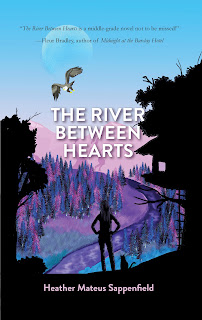THE ALTERNATE UNIVERSE OF SMALL PRESSES (Guest Post by Heather Mateus Sappenfield)
I had an agent. We parted ways.
We’d started out as newbies together, then both grown and were no longer a fit. I can’t blame her really. Most agents like to specialize, which means if they rep you for one type of book, they expect you to keep writing that same sort of book. For many writers, that’s fine, and they can build a brand that readers know. For me, though, a story arrives via a narrator’s voice. Sometimes that narrator is eighteen, sometimes thirty-eight, sometimes almost-eleven. I write the story that voice needs to tell, and so I’ve published two YA novels, a literary short story collection, and most recently a MG novel. With the first two books, that agent sold them to a larger press. With the second two books, I had no agent, rather published via contests with smaller indie presses, and this alternative turned out to be wonderful.
The truth is, publishing’s traditional route can be reactionary and narrow in scope. You may have written a terrific book, but it’s being declined time after time because it doesn’t fit with what’s hot right then. Take heart, there’s a fabulous world of indie presses out there, hungry to publish originality and variety. Most of them will offer little if any type of advance, but tend to provide better royalty packages that you will begin earning right away. They will cradle your book in their palms and hold it close throughout editing, cover design, and production. Marketing will be completely up to you, but—news flash!—it always is, whether you’re with one of the biggies, or a micro publisher.
Where you’ll notice a difference is with bookstores. The current distribution system favors big publishers, no two ways about it. There are established highways from them to bookstores, via reps, marketing and book organizations, that can often be cost prohibitive. (Name a big book and it’s most likely had A LOT of money spent on marketing.) But take heart. Keep your head down and work at it on a regional level, and you’ll probably get results similar to if you’d gone the traditional route.
I’ve been fortunate: I’ve entered contests with small presses and won. But you can also submit directly. There are some caveats with small presses, though. First, consider their mission statement and discover if their publishing ethic fits your manuscript. Second, study their catalog of published works and note their aesthetic. Third, confirm their distribution channels; if they use IPG, PGW, or IPS, or a distribution arm of a larger publisher, bookstores are going to be more open to ordering your book. Fourth, explore how their books have performed post-publication, in contests, on Goodreads. Fifth, look into if they’ve produced audiobooks, if they’re marketing film rights. Do your research, make sure the press is legit, know its history and essence, and be honest with yourself about whether it’s a match for you. And then, if it feels right, step into this universe and submit.
~
In Heather Mateus Sappenfield’s “The River Between Hearts” (Fitzroy Books/Regal House, February 1, 2022), third grader Rill’s father disappears, lost to a turbulent river. A year later, everyone insists he’s gone, but Rill is still certain he’s coming back. When Rill discovers her classmate, Perla, hiding out in Rill’s tree house after Perla’s family is deported, the two form an unlikely bond. Together, the girls embark on a remarkable adventure which tests their understanding of themselves, each other, and of the world around them—and opens new, unexpected doors to healing.


Comments
Post a Comment